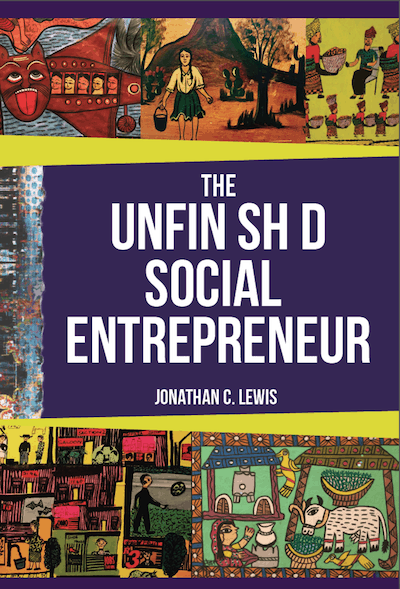The Dirty Secret of Social Enterprise: Scale is Overrated
Unless you’re a fish or a snake, what’s so great about achieving scale? For social entrepreneurs, the task of scaling our social enterprises (or not scaling them) induces heartburn.
Social entrepreneurship calls us in the direction of big, brash, system-disrupting, system-stopping, system-innovating solutions. Without growing our social ventures, without moving our careers up the ladder of professional success, without achieving economies of scale, without becoming big enough to be seen by investors and journalists, without a “scalable model,” are we doing enough? Are we reaching our full potential as changemakers? If our programs are small in size and stature, do you and I matter?
To give the notion of scale its due: We are in an urgent fury to achieve system-wide, broadly reaching social justice. We take it personally that a billion people can’t drink clean water. We take it personally that 29,000 children die every day from poverty. We take it personally that our globe is getting hotter. We take it personally that women are abused or sexually trafficked. That 2.4 billion people don’t have basic sanitation. That wars are the macho solution for government officials who don’t fight or die in them. That, around the world, on this very day, 27 million people are enslaved. The internal moral pressure to do more, get bigger, reach greater numbers and forestall total environmental disaster weighs heavily on our hearts – and in our business plans.
Thoughts on thinking big

Thinking big is a time-honored tradition. In business, economies of scale mean greater efficiency, lower prices and higher profits. In government, scale means inclusiveness, protecting the rights of every citizen and participatory decision-making. In ecological terms: air and water ignore manmade borders, so comprehensive, scaled environmental action is the only way to save the planet.
At the other end of the scale (so to speak), Amy Paulson, co-founder of the Global Gratitude Alliance, adds: “In community development, small is good. Scale forces us to look at people as issues to solve, not as individual humans with complex and unique needs. Scale brings up many other difficult questions, like what metrics really make sense, not for our donors, but for the communities we serve? How willing are we to forgo quick wins for long-term, messy and complex sustainable change that can often take decades or generations?”
For social entrepreneurs, the important thing is progress towards social justice – not organizational size, geographic coverage or budget. “Can you really help everyone?” asks Dylan Hrycyshen, community development coordinator at a Canadian small-business incubator. “Tell me what your product or service actually does, and skip all the fluffy language about being the most socially conscious provider. Stop scaling before your idea becomes a [reality]. It’s about the real way your service improves lives within your community. Impact is about connection, and that doesn’t happen when scaling is the objective.”
Different social entrepreneurs think about growth differently. If our social venture is a product solution, like solar lights or treadle pumps, then growth might mean wider distribution to realize economies of scale. If our thing is social services, like health care or education, the more people served, the better – provided that our touch is deep, tender and life-affirming. If we stand in opposition to political corruption and the denial of civil liberties, then turning the gears of government more humanely is our way of thinking about scale. Some organizations grow organically, and some do not; for example, some partner, collaborate or replicate. Some grow inwardly, scaling deeper into the communities to which they have committed their careers. The permutations are uncountable.
some ideas aren’t scalable
Obsessing about size and scale is fraught with growing pains, most often experienced as sharp pains in the ass. First, as our social ventures get larger, they require new leadership skills, new internal systems and new budgets. Second, for some organizations and some leaders, scale becomes psychologically addictive, a gateway drug leading to mission drift.
Third, not all programs are scalable. Not all projects can produce a profit. Not everything worth doing earns recognition, wins a competition, attracts fat cat investors or garners a foundation grant. For many worthy social justice organizations, chasing scale is wholly unrealistic.
Because social progress is human progress, it’s really thorny to isolate what drives, or impedes, social change. People lead varied and complicated lives. Within the borders of our lifetimes, people laugh, dance, drink water, fall in love, fall out of love, sweat, work, raise kids, cook food, make music and make mistakes. We have dreams; we have nightmares. Deep inside the ecology of a community so much of what happens is intangible, without clear causation. So much of what binds a community of people or creates economic opportunity is invisible and hard to capture with measurable certainty or cash dividends.
“Few of us can do great things, but all of us can do small things with great love,” avows Nobel Prize Laureate Mother Teresa. If we can’t do it small, can we ever hope to do it large?
Bigger is not always better. There is no best organizational size. Getting and maintaining the balance is, well, a balancing act.
Jonathan C. Lewis is a lifelong social justice activist and accomplished social entrepreneur.
- Categories
- Health Care, Impact Assessment, Social Enterprise



